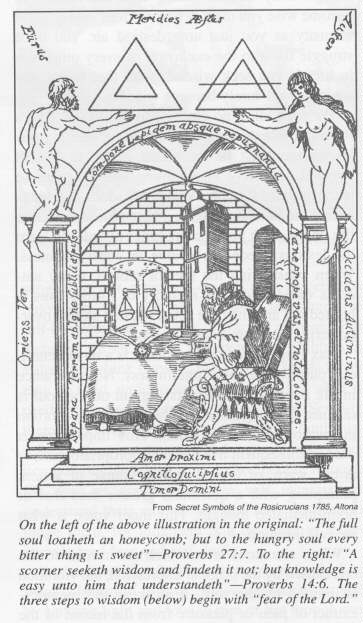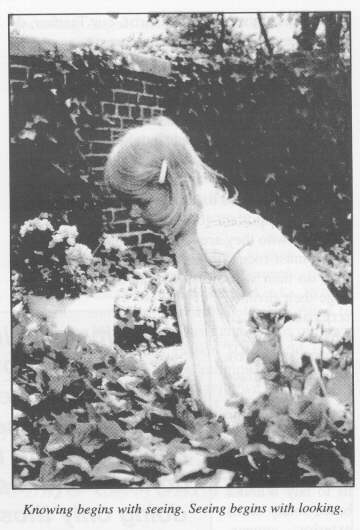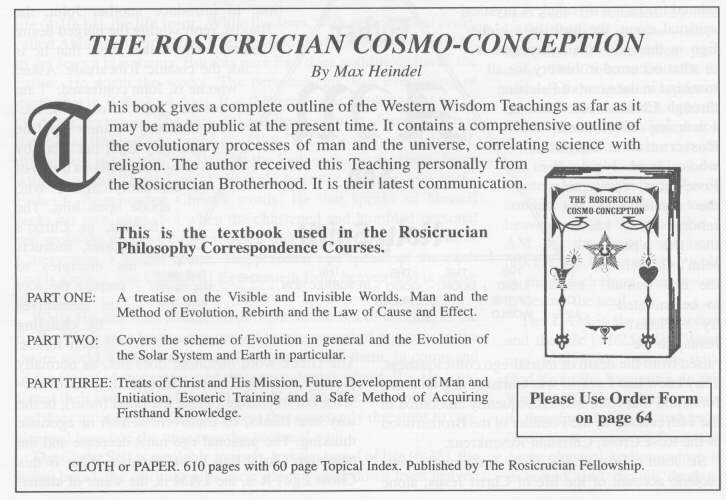


| rosanista.net | ||
| Simplified Scientific Christianity |



Many of us are on the spiritual path, seeking the Light, searching for Truth. Christ said: "The truth shall make you free." Max Heindel said truth is not found once and forever. Truth is eternal and the quest for truth must also be eternal. There is no faith once and for all time delivered. There are certain basic truths which abide but which may be considered from many sides, each giving a different view which complements the previous perceptions. Therefore, so far as we can see at present, there is no likelihood that we will know the whole and ultimate truth and be able to rest from our quest. Truth, like God, is universal and infinite. It knows no boundaries. But when the Virgin Spirits of the human life wave became enveloped in "veils" of individual vehicles, dissociated from the Cosmic All, they became incapable of directly understanding and experiencing absolute truth. But even with this separation, man has not altogether forgotten his true home.
Man has always been in quest of knowledge in the physical world and ever seeking to determine who he really is. The path to first-hand knowledge is not easy. Nothing worth having ever comes without persistent effort. All that anyone is or has is the result of effort. What one lacks in comparison with another is latent in himself and capable of development by proper methods.
To know truth, we must desire it with intensity. Heindel relates the story of the young man who came to the sage and asked: "Sir, what must I do to become wise?" The sage did not answer. The youth kept repeating the question, with the same result. At last he left the sage but returned the next day with the same question. Again no answer was forthcoming so the youth returned on the third day to ask his question yet again. Finally the sage took him to a river and held him under the water, despite his struggle to free himself. At last, the sage released him and when the youth had regained his breath, the sage asked him: "Son, when you were under the water, what did you most desire?" "Air, air, sir, I wanted air." "Would you not rather have had riches, pleasure, power or love my son? Did you not think of any of these?" "No sir, only air, I thought only of air." Then said the sage, "To become wise you must desire wisdom with as great intensity as you just now desired air. You must struggle for it to the exclusion of every other aim in life. If you seek wisdom with that fervor, my son, you will surely become wise."
We must allow no obstacle to thwart our search for truth. But the supreme motive for seeking this knowledge must be an ardent desire to benefit humanity, entirely disregarding self in order to work for others. In the Western Wisdom Teachings we are taught about rebirth-that we come back to life on the earth plane many times in order to learn the lessons needed to evolve in consciousness. When considering the fact of rebirth, many students wonder why the memory of former lives is blotted out and they are filled with an almost overpowering desire to know the past.
Max Heindel tells us that there is a most beneficial purpose for this forgetfulness. No experience in life is of value unless its imprint on the soul is retained for purgatorial and heavenly post-mortem instruction and assimilation. This impression is used in subsequent lives, at the appropriate time, to direct, warn, or urge a certain course of action, prompting with a quickness greater than that of brain-mediated thought. This inner voice is what we call intuition.
When situations arise which are similar to the one caused by the original impression, the vibration is intuited by the soul. It awakens the memory-extract of pain or pleasure from the record of the past life, more rapidly and accurately than if the experience itself were called up before the mind's eye. At the present time we might not be able to see the experience in its true light because we are hampered by the veil of flesh. The lives we have led are hidden from us until we know how to unlock the door; until we lift the veil of illusion.
Lifting the veils of illusion means being able to remember who we are and what our higher purpose is. It is going beyond the illusion created by living in the dense opacity of matter and remembering the truth of the higher realms. It is knowing that our higher consciousness is our primary, causal reality. It is learning to see the world through the eyes of our higher self, being able to discriminate between what is true and what is illusory.
Being able to identify and comprehend reality and truth is a function of our spiritual vibration. The more attuned we are to higher, subtler influences, the better able we are to correctly see ourselves and to regard others with compassion. At the unregenerate level, revenge is one way to handle the feeling of being wronged. Revenge would be that person's "truth." At a higher level, an individual understands the operation of the law of cause and effect and knows the value and virtue of sending love to one who has wronged him or her. As we harmoniously vibrate to ever wider spheres of existence, our grasp of truth will proportionally increase and the veils of illusion will disappear.
Illusion promises to give us one thing but actually gives us something else. We have experienced this when we have received something we wanted but it failed to deliver what we thought it would. For example: a woman may think all her problems with her husband will be solved by having a baby. After having one, she realizes that the baby brought her much joy but didn't solve the problems with her husband. Some people think that material wealth will solve their problems. They often learn that as they accumulate money their problems increase unless they work directly on solving them. They realize that money cannot give them inner peace, solve their relationship difficulties, or give them a sense of security. They must work directly on those issues rather than succumb to the false promises offered by substitution therapy.
How might our life change if all our illusions were gone and we knew higher truth? We would choose those things that fulfilled us and best represented who we are. We would be able to accurately assess situations and know what actions to take to produce the result we want. We could recognize the level of people's understanding and development. We would be able to distinguish between appearances and the underlying reality in people and situations. We would not presumptively believe what we were told, and we would know what was true for us. We would stand by our beliefs, even if others around us believed differently. We would have a clear vision of our purpose and know what actions to take to accomplish it. We would see beyond people's personalities to their higher selves. We would not let self-doubt or thoughts of worthlessness deflect us from our path. Believing in ourself and our path, we would have greater strength and courage to carry out our work.
When we were young, some of us may not have wanted to see our life and person as it was and therefore slowly contracted our vision. Some literally abused their healthy vision and had to wear glasses to restore it. Now older, we can affirm that we are ready to see the world clearly. Many people find their eyesight improves when they become willing to see the world as it really is and begin lifting the veils of illusion. We must let go of our judgments if we would see other than illusions. By judgment we mean the purely subjective reading of an objective text.
We must learn to observe without projecting our thoughts onto others, imagining or making up stories about what is happening. How much do we color what we perceive with our judgments, projections or interpretations? If we practice describing things to ourselves just as they are we will see beyond the illusions created by the thoughts and feelings in back of our perceptions. To understand how we project our feelings about things onto other people, we may select an individual and focus on them, mentally describing them to ourself. If we are strictly honest, we will gradually observe the extent to which much of our world view and personal feelings are projected onto others.
When we judge others, we are usually simply projecting our own self-image and perceptions onto them. One who has not taken an exhaustive self-inventory is a poor character witness. For instance, we see people yelling at their children in a store and think they are bad parents. Instead they may be tired, under pressure, or doing just what is needed for their children at that moment. Sending them love will do more to help them (and ourselves!) than our negative judgment. As we practice non-judgment and learn to see people through the eyes of compassion, we will increasingly understand their motivations and have no need to judge them, for judgment is a response to unacknowledged fear and self-doubt.
We best serve evolution and ourselves by finding what is beautiful in each person we encounter and by sending light and love to him or her though our eyes, mind, and heart. We cannot serve people when we separate ourselves from them by judging them. Our higher Self and Christ, our Teacher, do not judge us. They send us an unremitting stream of love, illuminating and encouraging in us what is beautiful and good. This empowers us to be all we can be. We may have illusions about who people are because of our attachment to them. We may tend to stress how people might fulfill more of their potential. We may not want to accept the temporary person they are manifesting right now. Although it is good to hold a high vision of people, it is also important to see them clearly and love them for who they are at the present moment.
We must focus on the strength of others rather than on their weakness. We can always acknowledge their divinity, irrespective of appearances. When we look only at the surface of something, we actually devalue our own person. It would be unthinkable for us to buy a house based solely on its exterior appearance, without examining its interior. In the case of human beings, they are virtually all interior.
Great masters have no trouble walking unrecognized among us. Humility and discretion enable them to assume the appearance of ordinary persons. They do not call attention to themselves by a singular manner of dress, word, or attitude and thus we may rarely recognize them. Christ was not recognized by His own people. We must learn to see people with the eyes of the soul and look beyond their outward person. As we do, we can see the reality of their higher selves. We learn to relate their activities and traits to the higher purpose they are serving, however they may appear in the isolated view.
For instance, someone whose job is typing may be using that activity to learn how to connect his mind with his hands. Carpenters may be learning how to bring their own vision and that of others from the abstract mental plane into physical reality. Think of a friend and their job. See if you can find a deeper meaning for them in what they are doing. We cannot tell who people are from their earthly activities.
It is an illusion to think that if we are spiritually evolved we must be famous or highly visible as a spiritual leader. Many high beings live alone, working on the inner planes by radiating peace and by responding to calls for guidance from awakening souls. Many have quiet positions of service as gardeners, teachers of children, or caretakers. Only a few high beings volunteer to be conspicuous as spiritual leaders.
Public consensus about what is true does not thereby make the matter true. Numbers are not a valid criterion for determining truth. Entire populations have held erroneous opinions about reality. At one time it was thought that the sun revolved around the earth. But a few individuals changed the course of history and individual consciousness by questioning such mass beliefs and having the courage to explore and advance their new theories.
We must learn to go beyond what is commonly held to be true and discover our own truth. Max Heindel investigated the inner planes and gave forth wonderful teachings. But he was emphatic in directing us to investigate for ourselves. We must confirm and enlarge upon these truths independently, enlisting the wisdom of our inner tribunal.
Through enlightened ideas about the rights of all sentient life, diet and healing, peace, ecology and other issues, we are bringing a higher truth, a more holistic consciousness, to the earth plane. We must follow our hearts and minds and believe in the divine origin of our inner truth. As we discover and practice what is true for us, we will, by our example, assist others in finding their higher truths.
Integrity is an important aspect of spiritual growth. It is acting, talking, and behaving in ways that honor ourselves and others. It is examining things before we do them and, insofar as possible, doing only those things that we believe to be true. Living in integrity, in harmony with our beliefs and values, will accelerate our growth. It will bring clarity and order to every area of our life.
We must examine the opportunities that come our way and choose to take them not because they seem glamorous or may be materially rewarding, but because they make a contribution to human well-being. We may be challenged to come from our heart with people, rather than from our will. To follow our heart is to find a higher truth. We can find a higher truth by focusing on serving others.
We shall see more clearly when we willingly live the life where we have been placed, for the Recording Angels make no mistakes. They place us where we may encounter needed lessons that will prepare us for a greater sphere of usefulness. When the spirit has found truth and has come in contact with divine realities; when it has entered the region of abstract thought, which is the third heaven, and has seen that one great verity-that all things are one and that though they may seem separate here, there is an invisible thread uniting each with all-when the spirit has thus regained universality and love, it cannot believe in the illusion of separation any longer.
Ultimately, we will see things as they are, we will behold all creation—animals, angels, plants, and all the ranks of humankind— in their true being and order. We will feel better fitted to serve in the Vineyard of Christ and take as our own the words of Thomas Paine: "The world is my country, to do good is my religion." For only by service and unselfish love will we grow to the stature of Christ.
— Angela Ponce de Leon
— Rays from the Rose Cross Magazine, March/April, 1996

|

|

|
|
|
Contemporary Mystic Christianity |
|
|
This web page has been edited and/or excerpted from reference material, has been modified from its original version, and is in conformance with the web host's Members Terms & Conditions. This website is offered to the public by students of The Rosicrucian Teachings, and has no official affiliation with any organization. | Mobile Version | |
|